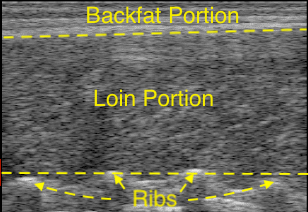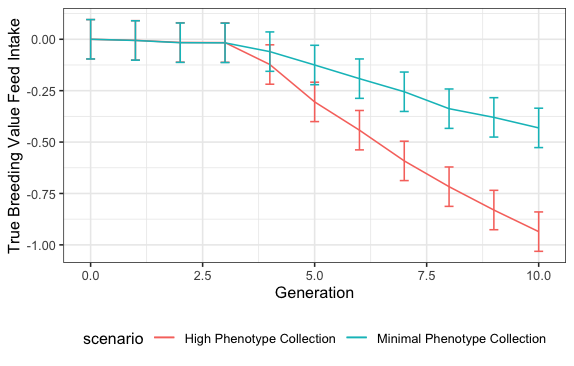Within any business process, optimization models play a pivotal role in quickly and efficiently generating outcomes that
satisfy a variety of constraints. With a clear understanding of the costs, decision variables, and constraints involved,
it becomes relatively straightforward to build an optimization model to address real-world problems. One of the first models
I developed—using simulated data—was a feed mill transportation problem, solved using a free optimization
library in Python. From there, I progressed to more complex models using real data across a range of use cases, including:
- Determining which plant a load of pigs should be sent to in order to minimize transportation costs while meeting plant capacity requirements.
- Assigning load crews to pig shipments to minimize crew travel time and reduce the risk of disease transmission.
- Scheduling the marketing of pigs based on predicted growth rates to maximize sort loss efficiency and minimize trucking costs.
- Calculating the optimal sale weight by factoring in current market prices, feed costs, growth rates, and mortality risks.
Below is an example of how, in Python, I simulated four different feed mills—each with unique diet manufacturing costs,
feed orders requiring different diet types based on the animal’s stage, and varying distances to each feed mill.
import pandas as pd
import numpy as np
from pulp import LpProblem, LpVariable, LpMaximize, LpMinimize, LpStatus, lpSum, value
import random
## Feed Mills
feed_mill = ["Mill1","Mill2","Mill3","Mill4"]
## Diet Types
diet_types = ["NUR1","NUR2","FIN1","FIN2","FIN3","LAC","GES"]
## Baseline costs / lb by Diet Type
baseline_costs = {"NUR1": 1.60,"NUR2": 1.30,"FIN1": 1.10,"FIN2": 1.00,
"FIN3": 0.85,"LAC": 1.35,"GES": 0.95}
# Difference in costs by mill
feedmill_costs = {"Mill1": -0.20,"Mill2": -0.01,"Mill3":0.15,"Mill4":0.10}
## Cost_lb by diet type and mill
costs_long = []
for diet in diet_types:
for feed in feed_mill:
cost=round(baseline_costs[diet]+feedmill_costs[feed]+random.uniform(-0.05,0.05),2)
costs_long.append({"feed_mill": feed, "diet_type": diet, "cost_lb": cost})
costs_df = pd.DataFrame(costs_long)
## Number of Orders (each order is a farm site)
loads = 25
## Simulate 'n' Feed Orders
orders = []
for i in range(loads):
if random.random() < 0.75:
feeds = [random.choice(diet_types)] # Full order of a single feed type
else:
group = random.choice([["NUR1","NUR2"],["FIN1","FIN2","FIN3"],["LAC","GES"]])
feeds = random.sample(group, random.randint(2, min(3, len(group)))) #split order
orders.append({'order': i+1, 'diet_type': feeds})
## turn it into pandas dataframe and add feed lbs
order_df = (pd.DataFrame(orders)
.explode('diet_type')
.reset_index(drop=True)
.assign(count = lambda x: x.groupby('order').transform('count'))
.assign(feedlbs = lambda x: round(26000 / x['count'],0))
.filter(['order','diet_type','feedlbs'])
)
## randomly create mileage data
mileage_data = {'order': [],'feed_mill': [],'miles': []}
for i in range(loads):
for mill in feed_mill:
mileage_data['order'].append(i+1)
mileage_data['feed_mill'].append(mill)
mileage_data['miles'].append(random.randint(5, 100)) # Random miles between 5 and 100
mileage_df = pd.DataFrame(mileage_data)
Using the simulated dataset I created the following constraints:
- Maximum total pounds of feed available at each feed mill.
- Maximum pounds of feed available for each specific diet type at a feed mill.
- If an order includes multiple diet types, all must be supplied by the same feed mill.
Below is the optimization model that meets the above contraints and minimizes manufacturing costs and miles:
## build cost matrix
cost_matrix = (order_df
## take every order to every mill
.merge(pd.DataFrame(costs_df['feed_mill'].drop_duplicates()), how='cross')
## bring in miles from feed mill to grower
.merge(mileage_df,on=['order','feed_mill'], how='left')
## bring diet cost for each mill
.merge(costs_df, on=['feed_mill','diet_type'], how='left')
## get costs
.assign(cost_miles = lambda x: (x['miles'] * 4.0))
.assign(cost_feed = lambda x: (x['feedlbs'] * x['cost_lb']))
.assign(cost = lambda x: (x['cost_feed'] + x['cost_miles']))
.assign(cost_lb = lambda x: x['cost'] / x['feedlbs'])
.filter(['order','diet_type','feed_mill','cost_lb'])
)
mill_max = (costs_df[['feed_mill']]
.drop_duplicates()
.assign(feedlbs = order_df['feedlbs'].sum()*0.40)
)
dietmill_max = (costs_df[['feed_mill','diet_type']]
.drop_duplicates()
.assign(feedlbs = order_df['feedlbs'].sum()*0.40)
## mill 4 is only sow farm feed
.assign(feedlbs=lambda x: np.where((x['feed_mill'].isin(['Mill1','Mill2','Mill3']))
& (x['diet_type'] == 'LAC'), 0, x['feedlbs']))
.assign(feedlbs=lambda x: np.where((x['feed_mill'].isin(['Mill4'])) &
(x['diet_type'] == 'LAC'), order_df.query('diet_type == "LAC"').sum()['feedlbs'],
x['feedlbs']))
.assign(feedlbs=lambda x: np.where((x['feed_mill'].isin(['Mill1','Mill2','Mill3']))
& (x['diet_type'] == 'GES'), 0, x['feedlbs']))
.assign(feedlbs=lambda x: np.where((x['feed_mill'].isin(['Mill4'])) &
(x['diet_type'] == 'GES'), order_df.query('diet_type == "LAC"').sum()['feedlbs'],
x['feedlbs']))
)
## set input
op_input_cost=cost_matrix.set_index(['order','diet_type','feed_mill']).to_dict()['cost_lb']
op_orders=set(zip(cost_matrix['order'],cost_matrix['diet_type'],cost_matrix['feed_mill']))
op_ordermill=set(zip(cost_matrix['order'],cost_matrix['feed_mill']))
op_orderdiet=set(zip(cost_matrix['order'],cost_matrix['diet_type']))
op_dietmill=set(zip(dietmill_max['feed_mill'],dietmill_max['diet_type']))
op_demand=order_df.set_index(['order','diet_type']).to_dict()['feedlbs']
op_overall_supply=mill_max.set_index(['feed_mill']).to_dict()['feedlbs']
op_dietmill_supply=dietmill_max.set_index(['feed_mill','diet_type']).to_dict()['feedlbs']
op_mill=(cost_matrix.drop_duplicates('feed_mill')).feed_mill
op_order=(cost_matrix.drop_duplicates('order')).order
# 1. Initialise model
model = LpProblem("MinimizeFeedCosts", LpMinimize)
# 2. Define Decision Variables
deliveries=LpVariable.dicts('order_mill',[(o,d,m) for o, d, m in op_orders],lowBound=0,cat='Continuous')
mill_assignment=LpVariable.dicts('assign_mill', [(o,d,m) for o, d, m in op_orders],cat='Binary')
# used to force orders to a single mill
mill_used_load = LpVariable.dicts('millused',[(o,m) for o, m in op_ordermill],cat='Binary')
total_mill = LpVariable.dicts('millcount',[(o) for o in op_order], cat='Continuous')
# 3. Define objective function: costs to ship feed for a load for a given feed mill
model += lpSum([op_input_cost[(o,d,m)] * deliveries[(o, d, m)] for o, d, m in op_orders])
# 4. Define constraints:
### Constraint 1: For each order diet demand met
for o, d in op_orderdiet:
model += lpSum([deliveries[(o, d, m)] for m in op_mill]) == op_demand[(o, d)]
# Add mill assignment constraint
model += lpSum([mill_assignment[(o, d, m)] for m in op_mill]) == 1
### Constraint 1.1: Deliveries for a diet type and order can only occur if corresponding mill is assigned
for o, d in op_orderdiet:
for m in op_mill:
model += deliveries[(o, d, m)] <= op_demand[(o, d)] * mill_assignment[(o, d, m)]
### Constraint 2: total feed from a mill has to be less than supply of a given mill
for m in op_mill:
model += lpSum([deliveries[(o, d, m)] for o, d in op_orderdiet]) <= op_overall_supply[m]
### Constraint 3: total feed from a mill/diet has to be less than supply of a given mill/diet
for m, d in op_dietmill:
tmp_order_comb = [(o) for o, d_inner, m_inner in op_orders if d == d_inner and m == m_inner]
model += lpSum([deliveries[(o, d, m)] for o in tmp_order_comb]) <= op_dietmill_supply[m, d]
### Constraint 4: Ensure all diet types for an order come from the same mill
#Link processor load-suf assignments to processor assignments
for o, m in op_ordermill:
tmp_diet_comb = [(d) for o_inner, d in op_orderdiet if o == o_inner]
model +=(mill_used_load[(o, m)] * 5 >= (lpSum(mill_assignment[(o, d, m)] for d in tmp_diet_comb)))
model +=(mill_used_load[(o, m)] <= lpSum(mill_assignment[(o, d, m)] for d in tmp_diet_comb))
# total processors for a load
for o in op_order:
model += (total_mill[o] == lpSum([mill_used_load[(o, m)] for m in op_mill]))
## An order can only come from one mill
for o in op_order:
model += (total_mill[o] == 1)
## optimize model
solver = PULP_CBC_CMD(threads=4, cuts=1, gapRel=0.01)
model.solve(solver)
## Generate Solution
variable_values = [(var.name, var.value()) for var in model.variables()]
solution = pd.DataFrame(variable_values, columns=["Variable", "Value"])
solution = solution[solution['Variable'].str.contains('assign_mill')]
solution = (solution
.assign(order=(solution['Variable'].str.split(",").str[0]).str.replace("assign_mill_(","").astype(int),
diet_type=(solution['Variable'].str.split(",_'").str[1]).str.replace("'",""),
feed_mill=(solution['Variable'].str.split(",_").str[2]).str.replace("'","").str.replace(")",""))
.filter(['order','diet_type','feed_mill','Value'])
.query('Value == 1.0')
.merge(order_df,on=['order','diet_type'],how='left')
.sort_values(by=['order'])
.filter(['order','diet_type','feed_mill','feedlbs'])
)
The 'solution' dataframe has for each order which mill the order should come from. The full python code
can be downloaded here .

